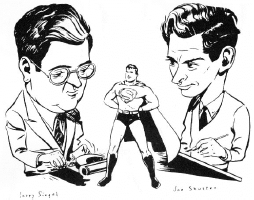Superman

"Superman, I've always thought, is an angel. Probably the angel stories found in all of the world's religions are traces of the work in our world of Superman and his relatives. Who is to say I'm wrong?" -- Andrew Greeley.
Jerry Siegel -- born on this day in 1914 in Cleveland, Ohio -- was a nerdy teenager with a passion for science fiction when he met his future lifelong collaborator, budding artist Joe Shuster. Together they self-published a variety of fantasy stories before they finished high school -- Jerry providing the stories and Joe providing the drawings.
In 1933, Siegel published a story called The Reign of Superman, in which the title character was a villain; indeed, the prevailing connotation of the word "superman" at that time was negative, being closely associated with the philosophy of Friedrich Nietzsche and its invocation by Nathan Leopold and Richard Loeb at their celebrated 1924 murder trial.
The concept of a man with a super-human powers stayed with Siegel, however, and with inspiration from Edgar Rice Burroughs' "John Carter," Siegel roughed out the character of a fighter for truth, justice and the American way who came to be known as "Superman." Rocketed from the exploding planet Krypton to Earth as a baby, he was adopted by the Kent family, who raised him as "Clark Kent." Kent worked as a mild-mannered, bespectacled reporter for the "Daily Planet," but when danger arose, Clark Kent would shed his meek veneer to become Superman -- "faster than a speeding bullet, more powerful than a locomotive, able to leap tall buildings at a single bound."
Siegel tried to peddle his character as a comic strip, drawn wearing a blue, tight-fitting costume and a red cape by Shuster, but to no avail. By 1937, Siegel and Shuster were producing stories for the Slam Bradley series at Detective Comics (DC), and after much prodding, DC finally agreed to run Superman as a feature in its new comic book series, Action Comics, in 1938. Superman became the first huge comic book success, virtually spawning the super hero genre and launching hundreds of imitators.
Meanwhile, Siegel and Shuster sold the rights to their creation for $130 (by contrast, a copy of the first issue of Action Comics could fetch up to $145,000 at the time of Siegel's death). They continued to produce Superman comics (and Siegel created another popular comic hero, The Spectre) until World War II, when the two left for military service. While they were gone, DC spun off a Superboy series without compensating Siegel and Shuster, so they sued DC and won a settlement of $100,000. Out of spite, DC failed to renew their contracts in 1948, and Siegel and Shuster struggled along, producing a comic strip for awhile, until DC re-hired the down-on-his-luck Siegel in 1958.
In 1978, DC's new corporate parent, Warner Communications, made amends to both Shuster and Siegel, restoring their creators' credit and giving them a yearly stipend, as Warner rolled out the first of its big budget Superman films with Christopher Reeve. Siegel died on January 28, 1996.
Of all the fictional characters created by the likes of Homer, Shakespeare and Dickens -- Siegel and Shuster's Superman is probably known to more living humans in more distant corners of the world than any of them.
Labels: Pop Culture





1 Comments:
Ron - I looked at your blog for about 10 minutes, and it took me about 10 seconds to decide to bookmark it. Will catch you later.
Jeff
Post a Comment
Subscribe to Post Comments [Atom]
<< Home